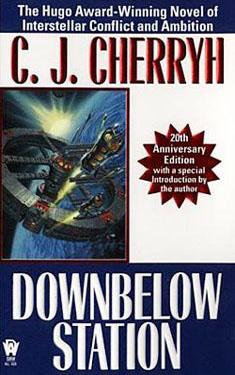C. J. Cherryh
Completed 1/16/2014, Reviewed
2 stars
I’m not a big fan of C.J. Cherryh. I know she has a huge fan following, but I
find her books a tough read. This was no
exception. It started out interestingly,
with a chapter summarizing Earth’s early space colonization activities. As space stations were built farther away, the
more remote stations and merchants, which formed the Union ,
began to rebel against domination by the Earth Company. Chapter Two begins the story in the middle of
the war between the Union and the Company at Downbelow Station, the first
station built around a planet inhabited by sentient, although primitive
beings. That’s where it fell apart for
me.
As many of my readers know, I don’t care for space operas. This is first of the operas to win a
Hugo. It’s full of anger, resentment,
bitterness, jealousy, gangs, riots, assassins, and greed. No one is really happy and it takes a long
time to figure out if any of the characters are even likeable. The book is divided into five parts, and Cherryh
spends a lot of the first three inside the characters heads. They’re low on action, and high in exposition
and setup. I found this unbearably
tedious. All the characters are
flawed. I don’t mind flawed characters,
but was sad was that most of them were cardboard and unredeemable.
Eventually, I discovered I did like a few of the characters,
but it took me until Part 4 to realize it.
Angelo Konstantin runs Downbelow station. Damon, his son and head of Legal Affairs,
turns out to have a heart. He’s
confronted with applying a mind-wiping procedure on Joshua Talley. Damon feels bad about permitting it, even
though Talley himself requests it. He
makes the effort to befriend Talley after the procedure is performed,
protecting him from the escalating problems on the station. Emilio, the other Konstantin son, works on
Pell, aka Downbelow, the planet the station orbits. Emilio has an affection for the Hisa, the
simian-like sentient species of Pell. That
made him likeable to me. Damon and
Emilio spend much of the book trying to keep the station, its inhabitants, and
its projects on the planet neutral in the conflict. I was also surprised to find myself liking
Talley, who you know is not one of the good guys, but through his mind-wipe,
appears to become redeemable.
The action finally picked up for me in the fourth part. After suffering through mind-numbing
exposition, there was finally some unmuddled action. That’s where I felt Cherryh shines as a
writer. It saved the book from receiving
a single star. As war finally comes to
Downbelow Station, Damon and Talley try to hide from the Unionists. It’s written with real tension and immediacy. It was first time I felt like I was actually
in the book, and happy to be inside the characters heads. Back on Pell, Emilio enlists the help of the
Hisa to hide him, his wife, and a large group of workers living on the planet,
from the conflict on the station. Again,
tension and immediacy.
Now for the Hisa. They
had all the makings of a good alien race.
They were primitive and had a close relationship with their planet. There was just something about the way they
spoke that was really annoying. Granted,
I didn’t expect them to be perfect English speakers, but they reminded me a
little too much of Jar Jar Binks in their speech patterns, even though Jar Jar
was created over ten years later. I also
didn’t like that they were effectively slave labor for the humans on Pell. Their simplistic devotion to the Konstantin
family was creepy, especially when I wasn’t yet sure the family wasn’t evil and
exploiting them. I did care for them,
though, and scenes involving them were some of the brighter parts of the story.
Now I have to make mention of something about Cherryh that drives
me nuts. She likes to drop articles and
words in common phrases. The one that
kills me is “of a sudden” instead of “all of a sudden”. She uses it a lot, so it’s always in your
face. She did this throughout “Cyteen”
and I thought it was an editorial or publishing problem. After this book, it appears it’s been a style
decision she’s employed at least since 1981.
Being someone who looks for mistakes and defects for a living, reading a
book with sentences like, “Of a sudden they undocked from station” invokes my
gag reflex.
As I mentioned earlier, after Part One, I wanted to give
this book one star. If I did, it would
have only been the second Hugo winner receiving that notoriety. Part Four saved it from that plight. Two stars.
Still, I don’t think I’ll ever read another novel by Cherryh.

No comments:
Post a Comment